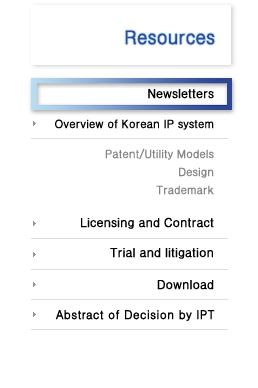2. KIPO starts the entry of Korean patent administration into Central Asia.
-KIPO and Uzbekistan Intellectual Property Office (UIPO) held a high-level meeting and a cooperative joint training (workshop) (August 21~25).
-The two discussed the IP-related informatization and cooperation to build a Korean style patent administration, etc.
KIPO discussed the building of a Korean style patent administration system for the UIPO. This is expected to be an opportunity of expanding the Korean wave of a patent administration to Central Asia following Middle East and South America.
On August 21, 2023, KIPO held a high-level meeting with Mr. Ikramov, Deputy Minister of Justice of the Republic of Uzbekistan and President of UIPO, a director of a bureau and working group, etc. in the Government Complex Daejeon, to discus the IP-related information and cooperation between the two countries.
In the meeting, broad agenda were discussed, including building the Korean style patent administration system in Uzbekistan and exchanging IP information (data) and providing a program to strengthen informatization capability for the Uzbekistan working group, etc.
After the meeting, an informatization cooperation joint training (workshop) was held from August 21~25 in Korea Institute of Patent Information. The joint training (workshop) proceeded with consultation to establish short-term and long-term strategies related to the patent administration informatization. To remove a gap in IP administrative capability by passing on the Korean IP-based economic development and secret (know-how), etc., the process of making an application by paper and online and the relevant information system were introduced.
In addition, various matters were discussed to share the results of developing the patent administration system using KIPO’s AI and the relevant cases and to introduce the AI technology in the patent administration system. Further, a visit to LG Innovation Gallery, etc. was included to experience the advanced technology utilizing a private sector’s AI.
On the basis of the content of this discussion, KIPO will send an informatization expert to the site in September 2023, to start the investigation relating to the building of the Korean style patent administration system.
3. KIPO intensively cracked down on Dongdaemun counterfeit market.
-A total of 1,230 pieces with 41 luxury trademarks (brands) including Louis Vuitton and Chanel, etc. were confiscated (corresponding to 20 billion Korea Won).
-Methods of selling counterfeit products were various such as by covering a vehicle number plate and by secretly transacting using a tablet PC.
On August 9, 2023, KIPO published that KIPO’s trademark special judicial police (hereinafter, referred to as ‘trademark police’) conducted intensive crackdown in ‘Saebit Market’ (called ‘yellow tent’, ‘Dongdaemun counterfeit market’) in Seoul during June 20 and 21, 2023, confiscating 1,230 counterfeit products of luxury trademarks (brands) and indicting, without detention, 6 wholesale and retail businesspeople (5 businesses) on charges of violating the Trademark Act.
According to the trademark police, the wholesale and retail businesspeople including Mr. K (male, age: 45) were under suspicion of selling the counterfeit products, such as purses, bags, etc. in Ilwon street stall in the Saebit Market.
Through the intensive crackdown, the trademark police confiscated a total of 1,230 counterfeit products (corresponding to genuine market value equivalent to 20 billion Korea Won) including 14 items (purses, bags, belts, watches, sunglasses, necklaces, etc.) of 41 trademarks (brands) (Louis Vuitton, Chanel, Gucci, Hermes, Rolex, etc.).
Even though Mr. K was a street vendor getting permission to occupy the Saebit Market from the Jung-gu Office in Seoul, subject to the trademark law compliance, he was caught in this crackdown since he had run an illegal business, such as sale of counterfeit products which was different from the permit conditions.
To avoid crackdown, a counterfeit product seller group parked a van at the outer road of the yellow tent and covered the vehicle number plate with a black fabric to prevent it from showing to the outside and sold the counterfeit products by using the inner sidewalk of the yellow tent.
The methods of selling counterfeit products have evolved. In the past, the business act was conducted while displaying the counterfeit products of luxury trademarks (brands) in a stall. However, recently, a sample of a counterfeit product without a trademark is displayed and a picture of product for sale is shown to a customer by a tablet PC, etc. and then the counterfeit product kept in the van is secretly sold.
Up to now, a small number of counterfeit products which were displayed in a stall were mostly cracked down when the investigation agency, such as KIPO, the National Police Agency, a local government, etc. conducted a crackdown and there were many cases where a great number of counterfeit products kept in a vehicle were not cracked down.
However, at this time, the trademark police followed up for more than 3 months, specifying the personal information and property, etc. of a counterfeit product seller, including Mr. K. and then, executing a seizure warrant to 5 businesses at the same time, thereby conducting the intensive crackdown to the sale stall and the vehicle used as a storage.
According to the trademark police, the merchants selling counterfeit products in the Saebit Market appear to be small street vendors but in fact they are corporate illegal businesspeople who embezzle high profits in cash, correspond to 70% of the sale price (according to the statement of the accused). As the number of foreign tourists has increased after the periodic epidemic of an infectious disease, their criminal interests are expected to be greater.



